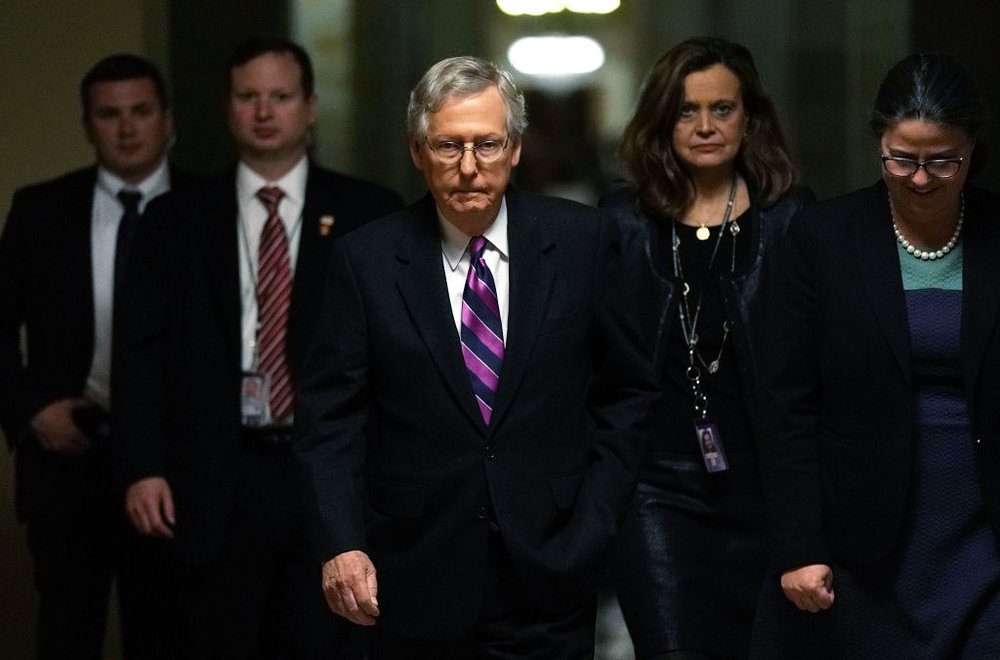[ad_1]
Seeking vengeance, Democrats may drop a political bomb on Washington—the end of the filibuster.
WASHINGTON, DC – DECEMBER 21: U.S. Senate Majority Leader Sen. Mitch McConnell (R-KY) walks towards the Senate chamber with aides after the House passed a bill to temporary fund the government through January 19 and averted a shutdown December 21, 2017 at the Capitol in Washington, DC. (Photo by Alex Wong/Getty Images)
Democrats are confident that they are within striking distance of taking both the Senate majority and the presidency this November. One consequence of such a victory could be an emboldened Democratic Party that is willing to change the rules. On their wish list, between the abolition of the electoral college, DC statehood and court-packing, is an end to the filibuster once and for all. By ending the filibuster, Democrats may be able to pass all of their outlandish agenda without a peep from Republicans. Green New Deal, Medicare For All, free college, you name it.
This permanent nuclear option, beyond potential temporary policy gains made by either party, will break American democracy.
Elizabeth Warren declared in February on the Democratic debate stage that, “If Mitch McConnell is going to do to the next Democratic president what he did to President Obama, and that is try to block every single thing he does, then we are going to roll back the filibuster.”
While this can be pushed aside as a radical opinion by an outspoken progressive, moderates in the Democratic party have recently become sympathetic to the idea, such as Senator Coons and Manchin. They refuse to allow for a Biden presidency to end in the same way they view President Obama’s—a scaled-back Democratic agenda. The wounds over the passage of the Affordable Care Act are still fresh in the minds of many on the left, as Democrats were one Senator away from the all so elusive 60 vote supermajority.
The Democratic party is considering lighting a fuse in Washington, trading potential long-term chaos for immediate policy gains.
Senate Minority Leader Schumer, eyeing a potential Democratic majority in the Senate, declared that “nothing is off the table” last year in response to questions regarding the elimination of the filibuster. The shift in tone by Minority Leader Schumer is striking, who had previously warned Republicans of invoking the ‘nuclear option’ on Supreme Court nominations, previously stating: “Mr. President, the 60-vote bar in the Senate is the guardrail of our democracy.”
In 2017, Republicans had the same opportunity that Democrats are desperately vying for, control of both Congress and the Presidency. While debate was held on the elimination of the filibuster, the party ultimately decided against it, fearing the long-term consequences, and likely, the consequences of a Democratic majority using the lack of filibuster rules to their advantage.
President Trump, an avid supporter of the removal of the filibuster, has butted heads with Mitch McConnell and rank-and-file Republicans, and previously moderate Democrats, on this issue. Trump called for its removal, citing the need to pass of his political agenda, especially before the 2018 mid-term elections.
While the filibuster is not outright written into the Constitution, it is a Senate rule, having been first used in 1837.
The filibuster prevents the tyranny of the majority, allowing for the minority party to have a say in policymaking and to defend their interests on a particular policy. Thomas Jefferson once said, “great innovations should not be forced on a slender majority—or enacted without broad support.” The founders had the intention of crafting a slow-working government that favored popular interests rather than partisan ones.
James Madison in his notes wrote that the Senate was the, “first to protect the people against their rulers [and] secondly to protect the people against the transient impressions into which they themselves might be led.” Without meaningful discourse and an empowered minority party, majorities will rush to pass their legislative agenda with little opposition. The eradication of filibuster rules will heighten the partisan divide in the country, as both parties will seek to pass impactful legislation without consultation with the minority party.
Supermajority rules are purposefully in place all throughout the U.S. government. They exist in the procedures to amend the constitution, overriding vetoes, and convicting presidents in an impeachment trial.
By making it hard for the federal government to pass law and modify the foundational principals of our government, the framers intended to uphold the notion of federalism, empowering the states to pass their own laws. The federal government, while slow and at times inefficient, is working as intended.
Jefferson, fearing the possibility of a fast-paced federal government, penned a letter to James Madison saying “I own I am not a friend to a very energetic government. It is always oppressive.”
The filibuster rule prevents the fast-pace, fast-passage legislative process that unified majority parties desperately seek. It empowers the minority party to debate policy, purposefully standing in the way of the reckless passage of policy. Policy with little chance of passing outside of a simple majority, should rightfully be debated.
Conservatives should oppose changes to the filibuster, as it will make it harder to do what William F. Buckley said defined a conservative in the first place, standing “athwart history, yelling Stop, at a time when no one is inclined to do so, or to have much patience with those who so urge it.”
The removal of the filibuster prevents a slow deliberation on policy that has benefited American democracy for over 150 years. The opposition party being able to yell ‘stop’ at potentially harmful legislation is a critical part of the protection of minority rights.
The filibuster protects the minority party and provides a much-needed check on government. It allows for our system of governance to be steadied, tending more towards federalism, allowing for compromise within the Capitol, and making discussion before passing critical legislation necessary. The political extremism unleashed in its absence is something many Americans will be unwilling to tolerate.
[ad_2]
Read the Original Article Here

